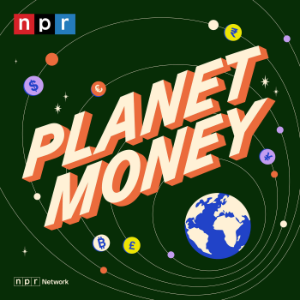
Planet Money
NPR
Wanna see a trick? Give us any topic and we can tie it back to the economy. At Planet Money, we explore the forces that shape our lives and bring you along for the ride. Don't just understand the economy – understand the world.
Wanna go deeper? Subscribe to Planet Money+ and get sponsor-free episodes of Planet Money, The Indicator, and Planet Money Summer School. Plus access to bonus content. It's a new way to support the show you love. Learn more at plus.npr.org/planetmoney
Location:
New York, NY
Networks:
NPR
Description:
Wanna see a trick? Give us any topic and we can tie it back to the economy. At Planet Money, we explore the forces that shape our lives and bring you along for the ride. Don't just understand the economy – understand the world. Wanna go deeper? Subscribe to Planet Money+ and get sponsor-free episodes of Planet Money, The Indicator, and Planet Money Summer School. Plus access to bonus content. It's a new way to support the show you love. Learn more at plus.npr.org/planetmoney
Twitter:
@planetmoney
Language:
English
Website:
http://www.npr.org/planetmoney
Email:
planetmoney@npr.org
The Consumer Sentiment vs. Consumer Spending Puzzle
Duration:00:19:58
Days of our Tariffs
Duration:00:30:03
The obscure pool of money the US used to bail out Argentina
Duration:00:29:17
Buy now, pay dearly? (update)
Duration:00:25:09
A new experiment in remote work … from the inside
Duration:00:28:16
Everything’s more expensive!! Pet Care!! Concert Tickets!! (Two Indicators)
Duration:00:17:39
After the shutdown, SNAP will still be in trouble
Duration:00:29:47
The remittance mystery
Duration:00:28:26
Should the fine have to fit the crime?
Duration:00:25:36
TikTok’s Trojan Horse Strategy
Duration:00:25:03
How Russia’s shadow fleet is sailing around oil sanctions
Duration:00:31:18
The year NYC went broke
Duration:00:31:59
How the government got hedge funded
Duration:00:28:10
Two ways AI is changing the business of crime (Two Indicators)
Duration:00:19:39
The Planet Money Game: Test our prototype
Duration:00:35:41
We make a board game
Duration:00:32:17
How refrigeration took over the world
Duration:00:23:29
How Jane Street’s secret billion-dollar trade unraveled
Duration:00:28:53
In Gaza, money is falling apart
Duration:00:35:07
When CEO pay exploded (update)
Duration:00:22:49